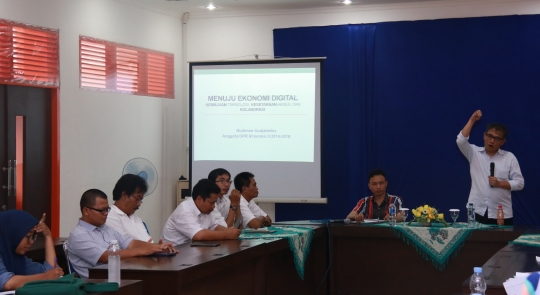At the Coverence Room of International Relations Department, Monday (13/3), International Affairs Department held a Public Lecture “Towards a Digital Economy”. As a speaker is Budiman Sudjatmiko M.Sc, M.Phil., AnggoTa DPR RI Commission II 2014- 2019. Public lecture attended by Vice Deans, lecturers, and Students Fisip Unsoed.
In his speech, Dean Fisip Dr. Ali Rokhman, greatly appreciate the holding of this public lecture, because the problem of the economy becomes a common problem and very easy to trigger the occurrence of conflict, especially in the digital world today. With this very interesting theme he hopes to the lecturers and especially for students to be able to attend public lectures so that there is a transfer of knowledge between practical and academic level.
In his introduction, Budiman Sudjatmiko M.Sc, M.Phil said that in this general lecture, there will be no classical HI theory that makes the state as the main actor. Because the state can not be placed in the position of international relations, but only in a global position. The technological revolution fundamentally changes all aspects of people’s lives, from way of life, work, interaction to social, economic and political institutions. The technological revolution has driven the political economy revolution. In the colonial economy, it can be assumed as a sucking economy, where there are masters and slaves, but in today’s economy, more like dependence, how a country is politically independent but not free economically.
Global trends, such as economic sharing or economic and production collaboration, have built the framework of the digital era system into participatory market societies. With network-based characteristics, decentralization, diversity and public participation. So the village is able to move toward the global economy through the digital economy, based on creativity, innovation and collaboration. The village can build its own production power and can drive its own economy so that it can enter the global economy. Equitable Access to technology for villages and collaboration between villages and the world, will accelerate poverty reduction and village progress.


